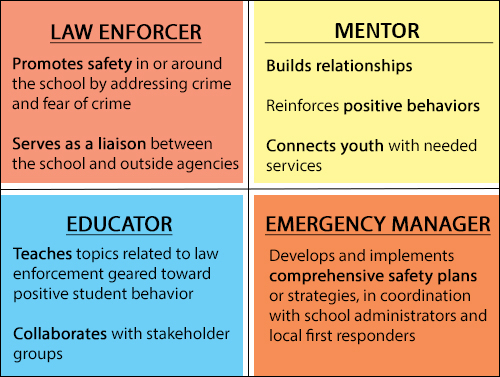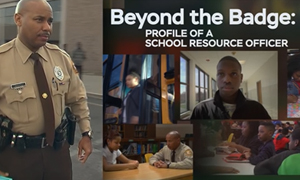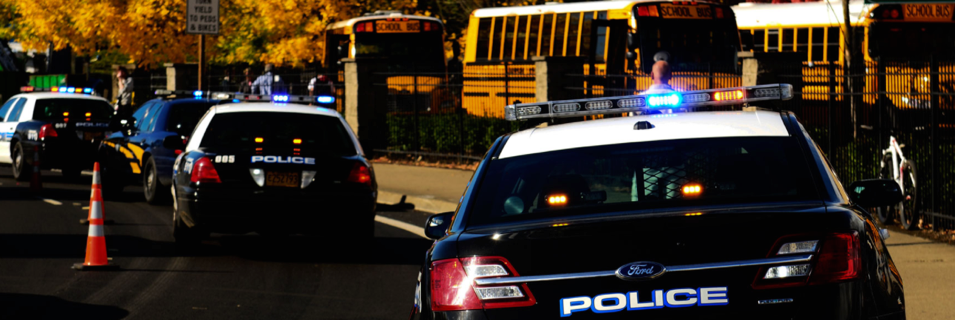The COPS Office supports safe schools by providing grant funds, technical assistance, and resources to help deploy school resource officers (SROs). Learn more about SROs and all of our projects and resources that support school safety.
Guiding Principles for School Resource Officer Programs
What is a School Resource Officer?


Not in Our Town and the COPS Office present the documentary, "Beyond the Badge: Profile of a School Resource Officer"
SROs are sworn law enforcement officers responsible for safety and crime prevention in schools.
A local police department, sheriff's agency, or school system typically employs SROs who work closely with school administrators in an effort to create a safer environment.
The responsibilities of SROs are similar to regular police officers in that they have the ability to make arrests, respond to calls for service, and document incidents that occur within their jurisdiction.
Beyond law enforcement, SROs also serve as educators, emergency managers, and mentors. Learn more about School Resource Officers and School-based Policing here.
While an SRO's primary responsibility is law enforcement, whenever possible, SROs should strive to employ non-punitive techniques when interacting with students. Arrests should be used only as a last resort under specified circumstances, and SROs should never get involved in school discipline matters that would normally be handled by teachers and school staff.
Important Considerations When Assigning School Resource Officers:
Memorandum of Understanding (MOU)
To ensure collaboration between the law enforcement agency and the educational community, an agency receiving funding for SROs will be required to submit an MOU to the COPS Office prior to implementing its CHP grant. For more information please review the MOU Fact Sheet.
The COPS Office is committed to student success in a safe, supportive environment and the FY2020 COPS Hiring Program (CHP) includes awards to deploy school resources officers (SROs) in K-12 schools. To ensure officers have the knowledge and resources to work in school settings, all funded SROs complete the NASRO Basic School Resource Officer Course at no cost to the agency. For more information, please see the FY2022 COPS Hiring Program School Resource Officer Mandatory Training.
The level of safety in a school must be assessed using multiple indicators that apply to the total school environment. Assessments are one of the most effective ways to identify significant gaps in emergency planning before an incident reveals them with chronic plan failure.
In 2022, President Biden signed the Bipartisan Safer Communities Act (BSCA) to provide increased mental health services and federal funding for safe, healthy, inclusive, school environments for students, teachers, and staff.
The Readiness and Emergency Management for Schools Center (REMS-TA) helps schools and community partners to prevent, mitigate, respond, and recover from emergencies. REMS-TA offers no-cost training, technical assistance, and assessments for K-12 and secondary schools.
The Best Practices Clearinghouse supports COVID-19 recovery efforts in schools via a repository of best practices and lessons learned submitted by teachers and staff; institutions of higher education; and community stakeholders.
The National Center on Safe Supportive Learning Environments focuses on the Education School Climate Surveys (EDSCLS) reports and research, as well as technical assistance and grants to improve school climate in schools across the country.
The Center for Positive Behavioral Interventions & Supports (PBIS) provides state-level and district-level technical assistance to scale and sustain multi-tiered systems of support (MTSS) in schools. MTSS helps overall school climate and provides increased levels of support for at-risk children to promote success.
The COPS Office recently partnered with the U.S. Department of Education on the development of Safe School-based Enforcement through Collaboration, Understanding, and Respect (SECURe) rubrics. They will assist in properly implementing school resource officers (SROs) so that SRO programs can positively impact the lives of our nation's students. These rubrics offer guidance to communities and law enforcement agencies to help those interested in implementing the most effective SRO programs.
Averted School Violence
 The Averted School Violence (ASV) reporting system enables SROs and other law enforcement officers, school personnel and mental health professionals to share their stories and lessons learned, in order to improve school safety and help prevent future tragedies.
The Averted School Violence (ASV) reporting system enables SROs and other law enforcement officers, school personnel and mental health professionals to share their stories and lessons learned, in order to improve school safety and help prevent future tragedies.
Additional Resources
Ten Essential Actions to Improve School Safety
The COPS Office School Safety Working Group, which is composed of representatives from eight national law enforcement organizations, has identified 10 essential actions that can be taken by schools, school districts, and law enforcement agencies to help prevent critical incidents involving the loss of life or injuries in our nation's schools and to respond rapidly and effectively when incidents do occur.
National Association of School Resource Officers (NASRO)
NASRO is an organization that promotes safer schools and partnerships between students, school faculty and law enforcement by providing training and resources for school-based law enforcement officers (SROs), school administrators and other stakeholders.
 • Police in Schools Podcast by Mo Canady, NASRO Executive Director
• Police in Schools Podcast by Mo Canady, NASRO Executive Director
• To Protect & Educate: The School Resource Officer and the Prevention of Violence in Schools
• Standards and Best Practices for School Resource Officer Programs
- Campus Threat Assessment Case Studies: A Training Tool for Investigation, Evaluation, and Intervention
- School Emergency Preparedness Podcast by Gregory Thomas, formerly Office of School Safety and Planning with the New York City DoE
- K-12 Online Courses Developing Emergency Operations Plans (EOPs) 101
- Readiness and Emergency Management for Schools
- National Threat Assessment Center (NTAC)
- School Resource Officers and School-based Policing
- Schoolsafety.gov – Federal clearinghouse of recommendations for safe & supportive learning environment
- Readiness and Emergency Management for Schools (REMS) Technical Assistance (TA) Center. State Safe School Centers Webpage
- Federal Emergency Management Agency (FEMA), U.S. Department of Homeland Security (DHS), 2010. Developing and Maintaining Emergency Operations Plans (CPG 101), Version 2.0.
- Readiness and Emergency Management for Schools (REMS) Technical Assistance (TA) Center 2010. NIMS Implementation Activities for Schools and Institutions of Higher Education Education website
- Injury Prevention & Control: Division of Violence Prevention. Youth injury and violence prevention resources for school personnel and community members
- A Whole Community Approach to Emergency Management: Principles, Themes, and Pathways for Action Partnerships With Media Representatives

 Official websites use.gov
Official websites use.gov Secure .gov websites use HTTPS
Secure .gov websites use HTTPS 













